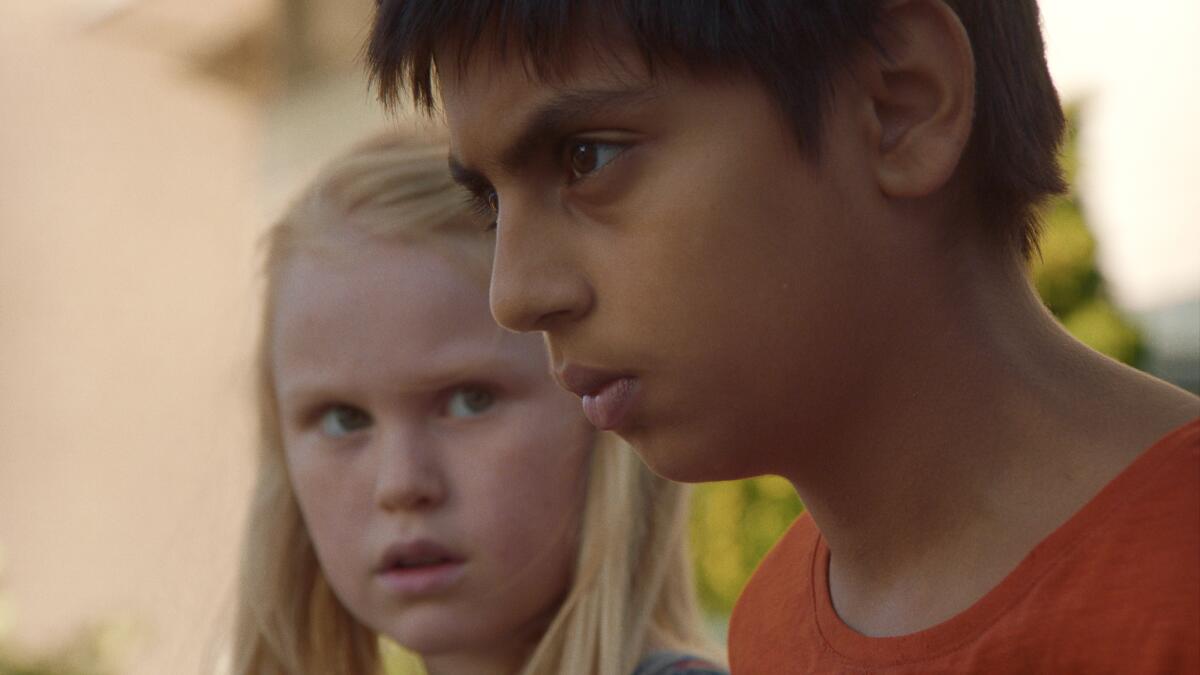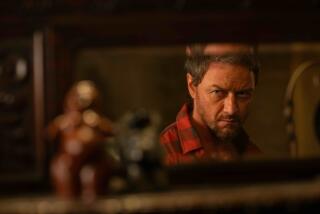Review: Supernatural horror arises from subconscious trauma in ‘The Innocents’

- Share via
The babes in the woods of Eskil Vogt’s “The Innocents” are some of the scariest kids you’ll see on a movie screen this year. Bored over the summer holidays, they while away the long hours inflicting a kind of casual cruelty on animals and other children, motivated by childish curiosity, subconscious trauma and newly discovered psychic abilities. Vogt, the Oscar-nominated co-writer of “The Worst Person in the World” and longtime collaborator of Joachim Trier, lays out the story of how and why these kids are trapped in this destructive cycle with careful economy.
Ida (Rakel Lenora Fløttum), with an imperceptible expression and long curtain of blond hair, arrives at her new home, an apartment in a large Norwegian housing complex next to a forest, with her parents and older sister, Anna (Alva Brynsmo Ramstad). As the parents dote on her autistic, nonverbal sibling, Ida is left by herself to face the playground, where she meets Benjamin (Sam Ashraf), who wants to show her a trick.
For your safety
The Times is committed to reviewing theatrical film releases during the COVID-19 pandemic. Because moviegoing carries risks during this time, we remind readers to follow health and safety guidelines as outlined by the CDC and local health officials.
Benjamin has discovered that he can move objects with his mind, using deep concentration to fling a bottle cap across the forest floor. It amuses Ida, and the two forge a unique friendship, based on their own dark predilections, experimenting with misbehavior, including kidnapping a wayward cat for a prank that turns harrowingly violent.
Though that incident gives Ida pause about Ben, they soon discover that the cat’s owner, Aisha (Mina Yasmin Bremseth Asheim), another young girl in the complex, has a psychic connection with Anna, able to sense the thoughts that she is otherwise unable to express. There’s a moment where the foursome exist in a kind of happy, bewildered harmony, with Anna, Aisha and Benjamin learning to develop their abilities. With Ida looking on, they become a little trio of “X-Men” characters: outsiders who are different, possessed of great powers that they don’t have the ability to quite control or understand. What they will do with these powers is the question driving the horror-tinged, supernatural drama.
This is Vogt‘s second feature film after 2014’s “Blind,” starring Ellen Dorrit Petersen, who plays Ida and Anna’s mother in “The Innocents.” Like “Blind,” this movie examines the darkness that creeps into the cracks of domestic spaces. Ida’s quietly hostile jealousy toward her sister manifests in disdain and sometimes passive aggressive violence, but in Benjamin’s home, fractured irreparably by abuse and neglect, darkness takes hold, and spreads to Ida, Aisha and Anna with increasing danger, resulting in bloodshed and tragedy.
Vogt’s direction is methodical, carefully laying out the geography of this space and each child’s family situation, bringing the audience behind the closed doors that their neighbors can’t see beyond. The housing complex itself represents the unique rules of this world: families living together but apart, placed in relationship to each other in densely populated apartments, isolated in nature. It’s the first film for each of the child actors, and they are remarkably subtle and astute in their performances. Vogt builds the tension slowly, the camera observational, slowly pushing in or pulling out. It’s almost like the frog being slowly boiled: Ida doesn’t realize how dire it’s become until it’s too late, as Ben spirals out of control.
It’s hard to condemn any of these kids because they’re victims of their circumstances — Ben’s violent expression is a crystallization of his trauma, pain and rage. The film maintains a quiet dynamic even throughout the most horrific moments, and while you might expect, or even want, the film to climax more operatically, the understated tone is a radical choice. It resists sensationalism while suggesting that the world of children is far more powerful, morally complex and violent than adults are even aware of, a notion both terrifying and fascinating. They are villains and heroes, but ultimately, they are all innocents.
Katie Walsh is a Tribune News Service film critic.
‘The Innocents’
In Norwegian with English subtitles
Not rated
Running time: 1 hour, 57 minutes
Playing: In theaters and on demand Friday
More to Read
Only good movies
Get the Indie Focus newsletter, Mark Olsen's weekly guide to the world of cinema.
You may occasionally receive promotional content from the Los Angeles Times.










